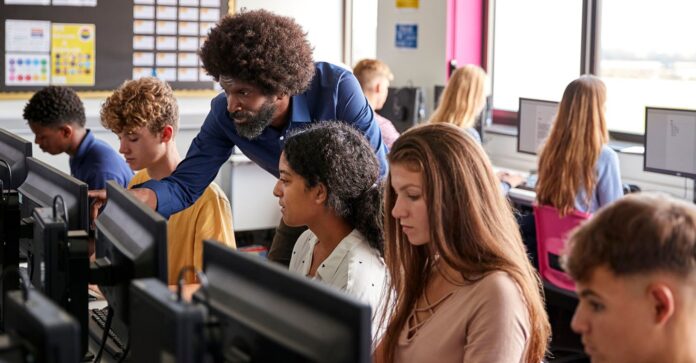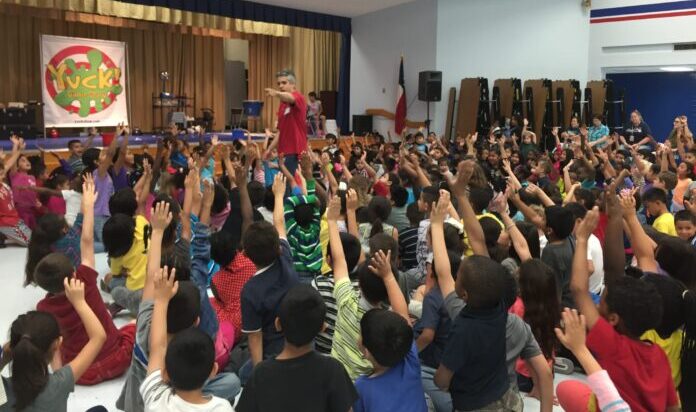School assemblies are much more than mere gatherings. They are significant events that bind the school community, fostering a sense of belonging and unity among students, teachers, and staff.
This blog post shines a light on the numerous ways school assemblies contribute to fostering connection and creating a vibrant, inclusive educational environment. From promoting school spirit to celebrating achievements, assemblies are integral to cultivating a positive culture.
Promoting School Spirit and Unity

School assemblies are a dynamic platform to promote school spirit. They involve students and staff in group activities, celebrating traditions and shared values.
School songs, cheering, and collective participation evoke a feeling of unity, encouraging students to identify with and take pride in their establishment.
This sense of unity extends beyond the assembly hall, permeating the entire school environment, strengthening relationships, and nurturing a feeling of oneness.
Assemblies also play an essential role in fostering unity. In a diverse student body, differences are inevitable.
However, through the collective experiences provided by assemblies, these differences are put aside, focusing instead on the shared identity as members of the same school community.
Activities that require cooperation or promote common goals emphasize the value of teamwork, demonstrating that unity is not just about uniformity, but also about appreciating and thriving amidst diversity.
Assemblies also break down the barriers of hierarchy within the premises. The school principal, teachers, administrative staff, and students – everyone participates equally.
This egalitarian nature of assemblies underscores the idea that every individual, irrespective of their role, is a valuable member of the community, contributing to its success and well-being.
Does your school organize fundraising? If so, check out our article on unique fundraising concepts that will help foster the feeling of community and connection among students.
Celebrating Achievements and Recognizing Success

The recognition of accomplishments is a key aspect of school assembly that significantly contributes to fostering a sense of pride and boosting self-esteem among students.
By celebrating academic achievements, athletic victories, and notable performances in extracurricular activities, educational institutions acknowledge the hard work, dedication, and talent of their students.
This recognition can also motivate other students, creating a healthy competitive spirit that encourages them to strive for their best.
Moreover, the recognition isn’t limited to individual accomplishments. Group achievements, such as winning a sports tournament or achieving a collective academic milestone, are also celebrated.
This approach fosters a sense of camaraderie and collective pride, highlighting that success can be shared and that everyone has a role to play in the school’s triumphs.
Cultivating a Positive School Culture

School assemblies have a substantial impact on creating a positive and inclusive school culture. These gatherings provide opportunities to address critical issues such as bullying, kindness, empathy, and respect for diversity.
Assemblies offer a platform for dialogue, encouraging students to express their views, learn from others, and work collectively towards a more accepting and respectful environment.
Assemblies also play a role in promoting values that are integral to a positive school culture. They are moments when the entire school comes together to reinforce its commitment to upholding these values, thus playing a crucial role in shaping the moral and ethical framework within which students interact.
The influence of these gatherings extends beyond the establishment’s premises, helping to shape students into responsible and compassionate citizens.
Showcasing Talents and Creativity
School assemblies provide a vibrant stage for students to showcase their talents, abilities, and creativity. Be it through dance, music, drama, oratory, or visual arts, these platforms encourage students to step into the limelight and express themselves, fueling their artistic passions.
Encouraging these expressions not only helps in talent development but also contributes to the holistic development of students, enabling them to explore and enhance their innate skills.
Moreover, by presenting their talents in front of their peers and teachers, students learn to handle both applause and constructive criticism, fostering resilience and confidence. It also encourages students to appreciate the talents of their peers, promoting mutual respect and admiration.
Such opportunities provide lifelong memories and foster a stronger sense of identity and self-expression among students.
Guest Speakers and Inspirational Talks

One of the highlights of many school assemblies is the participation of guest speakers. Inviting industry professionals, alumni, local leaders, or inspiring personalities can provide a fresh perspective for students, often connecting classroom learning with real-world scenarios.
These speakers can share their life experiences, lessons learned, and expert knowledge on a variety of topics, ranging from career guidance to social issues.
Inspirational talks can ignite sparks of ambition in students, motivating them to pursue their goals with zeal and perseverance.
The diverse perspectives offered by guest speakers can broaden students’ horizons, encourage critical thinking, and promote a deeper understanding of various societal and global issues.
It exposes students to a world beyond textbooks, enriching their knowledge and understanding of the world around them.
Building Strong Teacher-Student Relationships

School assemblies are pivotal in breaking down the formal barriers between students and teachers, fostering a more congenial and respectful environment.
Assemblies often give teachers an opportunity to interact with students in a less formal setting, building rapport and improving communication.
Such moments of shared laughter, applause, and even contemplation can facilitate mutual respect and understanding, creating a more open and positive learning environment.
Fostering a Sense of Belonging
The impact of school assemblies extends beyond academic learning or talent showcase; they play a significant role in creating an inclusive atmosphere, fostering a strong sense of belonging among students.
The collective experience of being a part of the program – singing the school anthem, participating in shared rituals, or cheering for their peers – connects students, making them feel like an integral part of the community.
Educational and Informative Assemblies

In addition to fostering a sense of community, school assemblies can also serve as platforms for educational enrichment and information dissemination.
Teachers can utilize this platform to complement classroom teaching, introducing exciting topics, or elaborating on complex concepts through presentations, documentaries, or interactive activities. This can ignite students’ curiosity and make learning more engaging and enjoyable.
Encouraging Active Participation
School assemblies offer excellent opportunities for student involvement in planning and organizing activities.
Students who take up roles in the assembly – as speakers, performers, or behind-the-scenes organizers – learn valuable skills such as teamwork, time management, and public speaking. This active involvement fosters leadership abilities and boosts students’ confidence.
Impact on School Climate and Student Behavior
School assemblies significantly contribute to shaping the overall school climate. A well-planned and inclusive assembly can cultivate a positive and supportive atmosphere, reflecting on student behavior and attitude.
When students witness their peers being recognized for good behavior or exceptional accomplishments, it motivates them to emulate these actions, leading to improved behavior and a harmonious school environment.









